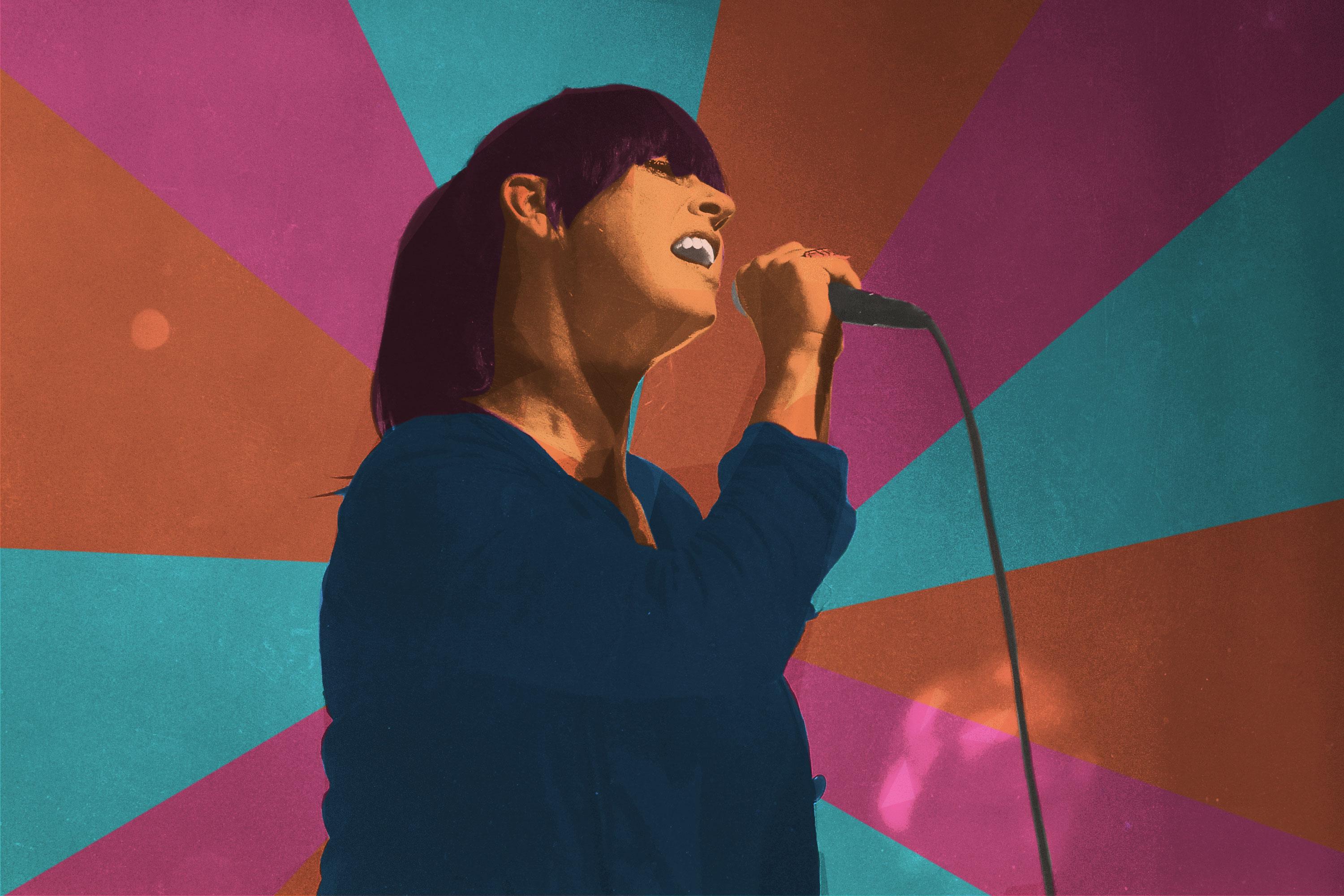
What an exquisite joy and an enormous relief to hear Chan Marshall’s voice again. Doubly so that she’s singing a Rihanna song. And triply so that as usual, she’s turning that song inside out. Her opening line—“Not really sure how to feel about it / Something in the way you move”—sounds vaguely familiar yet gently dislocated. (It’s the original song’s chorus.) But for longtime fans of the artist otherwise known as Cat Power, Marshall’s voice itself is unmistakable. A benevolent smoke monster. Dim dive-bar light filtered through stained glass. A strident 1930s bluesman as filtered through a tentative, ’90s-ascendant indie-rock star.
The song is “Stay,” Rihanna’s delicate, piano-driven 2012 duet with Mikky Ekko. And as arrestingly beautiful as Marshall’s extra-delicate rewrite might be—it’s the centerpiece of Wanderer, the first new Cat Power album in six years, out Friday—she’s not attempting a hostile takeover on the order of Aretha Franklin’s “Respect.” She just wants you to hear the song the way she heard it.
“I always knew she was a tough kid with a heart of gold,” Marshall says of Rihanna, chatting by phone in late September. “I could just tell. But I’m just too busy to get into fucking modern music or whatever.” But one day, when “Stay” came on the radio while Marshall was riding in a cab down Meridian Avenue in Miami, “She did it to me. The same way Aretha did it it to me with ‘Amazing Grace’ … and I learned what God really meant. Heaven, hell—I learned what God meant. When I heard Rihanna do ‘Stay’—and that guy, whatever his name is—when I heard her sing this song, she did it to me. She did. I saw her. I saw her. She revealed something she had, that I feel close to, that we all feel close to.”
Marshall herself has inspired that sort of religious devotion for more than 20 years. Her breakthrough album, 1998’s Moon Pix, has an eerie and devastated vulnerability that made the Atlanta native’s early live shows nearly unbearable, for her and for her audience alike. She would sing shattered hymns like “Cross Bones Style” or the startling piano ballad “Colors and the Kids” with her back to the crowd, if she managed to sing them at all. “There were a couple of places where Ms. Marshall’s concentration held through an entire number,” noted The New York Times cautiously, reviewing a disastrous 1999 show at the Bowery Ballroom.
But that weapons-grade volatility only enhanced the mystique of both the singer and the songs. As Marshall’s prominence and confidence grew, she morphed into a breathy 21st-century soul singer on albums like 2006’s The Greatest and 2008’s Jukebox, the latter her second full-length foray into transformative cover songs. Her version of the Rolling Stones’ “(I Can’t Get No) Satisfaction,” from 2000’s The Covers Record, ditches the riff and the chorus and the preening machismo entirely, turning one of rock ’n’ roll’s most ubiquitous songs into something alien and newly unforgettable. I saw Cat Power at the Apollo in Harlem in 2009, owning a stage even her most reverent fans couldn’t have ever imagined her owning. She opened with “Dark End of the Street.”
There is a through line in her approach from “Satisfaction” to “Stay,” from Mick Jagger to Rihanna, but Marshall in 2018 sounds unchanged yet feels reborn. “I just think that I feel closer to the way that I sang when I was a child,” she says. “I feel a freedom. There’s room and space and freedom in it to express myself more clearly.”
Wanderer is spare and mellow and intimate, with no time for the electronic flourishes and (relatively) pop-leaning impulses that animated her last album, 2012’s unlikely top-10 hit Sun. It is also her first album since 1996’s Myra Lee to not bear the imprint of Matador Records, the indie-label powerhouse long synonymous with Cat Power’s aura of ragged, grandiose melancholy. Marshall says she fully intended for Wanderer to come out on Matador, but the label rejected it. What did it think was missing? “Quote-unquote, ‘A hit,’” she says now. “Sorry: quote-unquote, ‘Hits,’ quote-unquote.”
Two other recent life changes—a major health scare that hit just as Sun was being released (“My lymphatic system started kicking my ass”) and the birth of Marshall’s now 3-year-old son—made her that much more protective of the album she’d made. (Wanderer, unchanged save for one remarkable new song, is out on Domino Records.) Unsurprisingly, her reverence for Matador has soured. “It’s a fuckin’ company,” she says. “You know? And I didn’t go to Harvard. I have a 10th-grade education. I’ve gotten by very well by singing these words to these strangers who’ve told me, ‘Chan, that song makes me feel this way, and I can relate to how you’re feeling, and I don’t feel alone when I hear this song.’ It’s reinforced that I’m not alone. That I am not crazy. That I am not alienated. That I am pretty all right, man.”
Wanderer has its quietly ferocious moments: The accusatory “In Your Face,” Marshall tells me, is “directed to those with that psychological ambivalence to the world that they seek to destroy, that they seek to consume and liquefy. These wretched people who hold no accountability in any court system, or heaven or hell. It’s basically almost like a curse I’m sending forth.” But softer and more mediative ballads like “Horizon” (“You’re on the horizon / I’m headed the other way”) and “Me Voy” (“I am leaving / Me voy, me voy / Good as gone”) abound, songs with a much lighter touch that nonetheless feel like gentle but firm waves goodbye.
Per the album’s title, Marshall still feels rootless, with a lengthy tour on the horizon and a new industry support system to navigate. But her son, she says, is all the foundation she needs now. That’s him peeking out from the lower-right corner of Wanderer’s cover, an accidental photograph while Marshall was trying on a dress she meant to wear while singing at a beloved friend’s funeral. “I was trying on that dress,” she says, “and my son got in the mirror, because I was trying to take a selfie to show my friend, ‘Is this how it fits? Cause it’s fucking tight.’ I’m a voluptuous mother now. So he was holding onto my guitar by the mirror, and while I was taking the selfie, it fell, and I caught it, and just—how deep, how I was hurting so deeply inside, and he smashed it. His light, his hilarious, mischievous character, my little boy, he smashed any sort of pain. He smashed it.”
The Rihanna cover aside, the flashiest song on Wanderer is the one Marshall added in the year interim between leaving Matador and joining Domino: “Woman,” a duet with none other than Lana Del Rey, who’d thanked Cat Power “for continuing to inspire me through your music and the work you do” in the liner notes for 2017’s Lust for Life. She later brought Marshall out on tour, and the two bonded quickly: Del Rey’s work, singular and interior but shockingly universal, has strongly echoed Marshall’s from “Video Games” forward. To hear them singing “I’m a woman of my word / Now haven’t you heard / My word’s the only thing I’ve ever needed” together is the fulfilment of a prophecy someone really ought to’ve had.
I ask Marshall whether she’s ever heard herself in younger artists, or in Del Rey in particular, but she insists she has not, though certainly she recognized something there. “All of her songs are so fucking painful,” Marshall says. “And she was like, ‘I am not sorry they’re painful. I love my—I have found beauty in pain. There is more beauty than you know. I am a survivor. I am telling my tale. There’s elegance in it, and I’m unapologetic. It’s my knowledge and experience, and it is beautiful—there is beauty in recollecting this tale.’”
That, too, is a very Cat Power sort of sentiment. “But I didn’t see myself, no,” Marshall concludes. “I saw her, and I think she’s magnificent.”

